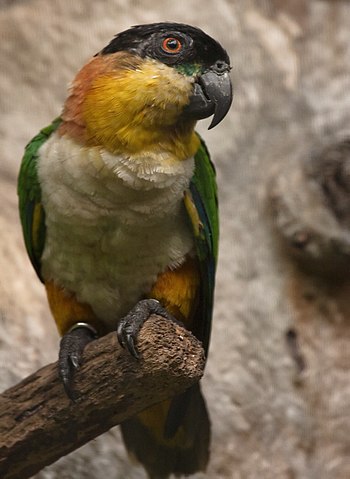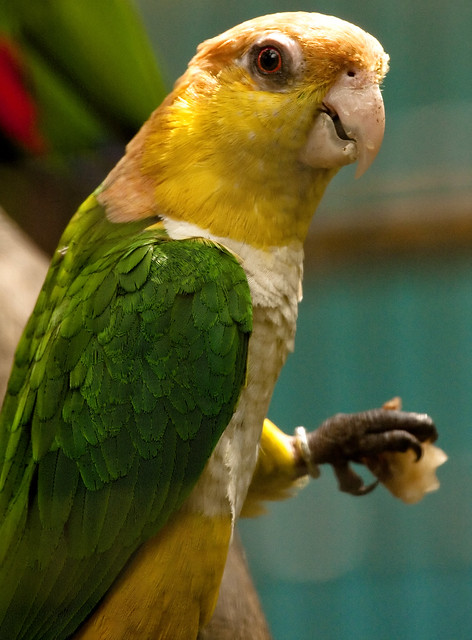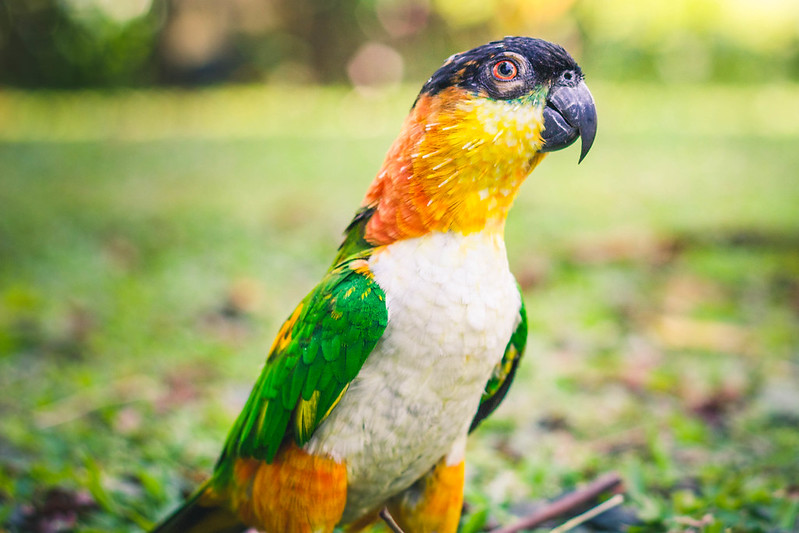 |
| Black-headed Parrot (also known as the Black-headed Caique and Black-capped Parrot) (Photo credit: Wikipedia) |
Food-Since Caiques are known for their love of food, starting with this tip seems very appropriate. They need fresh fruits and vegetables, sprouted seeds, some table food, and a high-quality pellet mix as a supplement. Change water as often as needed for it to be fresh. This will cut down on mold growth and infections that can result from ingesting mold. When feeding fresh food be sure to remove the food from the cage after several hours for the same reason.
Cage-Even though small, they are quite active and do best when they can move freely in the cage. Bigger is always better when it comes to the size of the cage, but a minimum size should be 24'" high by 24" wide by 24" deep. Since they are avid climbers, horizontal bars will be greatly appreciated by your bird. Avoid metals that are toxic to birds, and make sure your cage is certified as bird safe. Wood cages should also be avoided as they love to chew, and you would soon find your bird had escaped by chewing through the bars of a wooden cage. Sizing the cage properly keeps your pet happy, and can prevent undesirable behaviors from developing due to boredom. A happy Caique will provide unsolicited entertainment from morning to night, and all you have to do is have time to watch the show.
Interaction-These little parrots love people and need people to love them back. They can benefit from at least an hour a day of interaction with humans. They should be closely supervised as they are fearless little birds and can easily get into things they shouldn't. Go slowly and supervised carefully when introducing other pets. Never leave a child alone and unsupervised with the bird. Small children may unintentionally frighten, or make the bird feel threatened, and you can easily prevent disaster by being there when your Caique is exercising outside the cage.
Training-Caiques respond well to training. Most can learn to speak, do tricks, and whistle songs. And once these skills have been perfected they are more than willing to take center stage and perform for you, family, and friends. Training sessions should be short and daily if possible. Always reward your bird and end before your bird's attention span wanes. Remember that training is not only to teach your bird something new but is a great way to continue to bond with your Caique. Make it a time that your bird looks forward to.
Preserving their Health-With proper care these parrots have been known to live for as long as 30 years. Like many parrots, they are susceptible to airborne disease and infections such as Psittacosis and other respiratory illnesses unless their air is kept clean. Since birds in captivity are subjected to much more dander, feather particles, and other pollutants found in many households, filtering their air will keep their airways clearer, keep them healthier, and ultimately increase their life span.
By Debbie Davis - Article Source: EzineArticles
|






